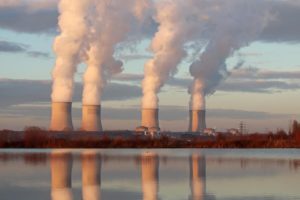 The European Union will need to continue having a nuclear energy share of at least one-quarter until 2050 to meet the emissions reduction targets it has set for that year, according to a new report from Deloitte. The EU has set targets of reducing emissions by 40% compared to 1990 levels, and by up to 95% by 2050 – or net zero. An essential part of that plan will be phasing out the burning of coal, the highest-emitting fossil fuel which is still used heavily in countries such as Poland and Germany. Countries such as France which have heavy use of nuclear power are getting a head start in the emissions reduction race, in which each EU member state will have to meet with their own adapted targets. With a share of 40%, nuclear provides the largest contribution to France’s energy mix. Nuclear power is not a fossil fuel and therefor emits very little in the way of carbon emissions. However safety concerns have resulted in its steady phase-out in Europe, first in the United Kingdom and now in Germany. Chancellor Angela Merkel announced a decision to phase out nuclear power in her country following the 2011 Fukushima nuclear disaster in Japan. But this has resulted in an increased use of coal and a resultant rise in Germany’s emissions, despite its heavy use of renewable energy. Forbes
The European Union will need to continue having a nuclear energy share of at least one-quarter until 2050 to meet the emissions reduction targets it has set for that year, according to a new report from Deloitte. The EU has set targets of reducing emissions by 40% compared to 1990 levels, and by up to 95% by 2050 – or net zero. An essential part of that plan will be phasing out the burning of coal, the highest-emitting fossil fuel which is still used heavily in countries such as Poland and Germany. Countries such as France which have heavy use of nuclear power are getting a head start in the emissions reduction race, in which each EU member state will have to meet with their own adapted targets. With a share of 40%, nuclear provides the largest contribution to France’s energy mix. Nuclear power is not a fossil fuel and therefor emits very little in the way of carbon emissions. However safety concerns have resulted in its steady phase-out in Europe, first in the United Kingdom and now in Germany. Chancellor Angela Merkel announced a decision to phase out nuclear power in her country following the 2011 Fukushima nuclear disaster in Japan. But this has resulted in an increased use of coal and a resultant rise in Germany’s emissions, despite its heavy use of renewable energy. Forbes
